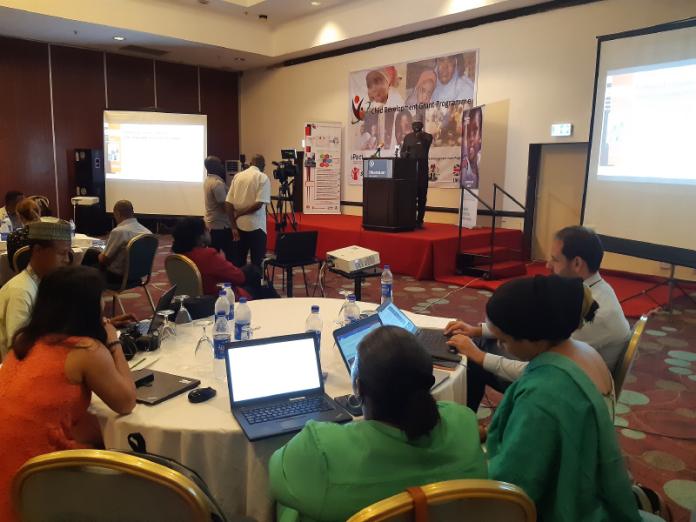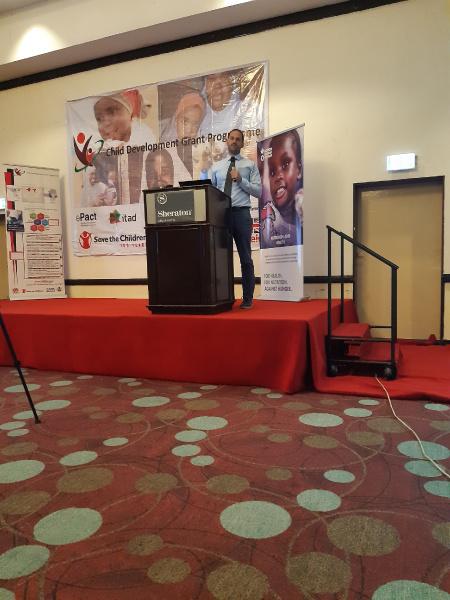Child development cash transfer helps reduce stunting rates in northern Nigeria
OPM team presenting evaluation findings from the Child Development Grant Programme
-
Date
July 2019
-
Areas of expertisePoverty and social protection (PSP) , Research and Evidence (R&E)
-
CountryNigeria
-
KeywordsNutrition , Social protection , Monitoring, Evaluation, and Learning (MEL)
-
OfficeOPM Nigeria
-
ProjectEvaluation of the Child Development Grant Programme (CDGP)
Oxford Policy Management-led evaluation of the Child Development Grant Programme (CDGP), implemented by Save the Children and Action Against Hunger, and funded by the UK Department for International Development, shows a positive impact of the programme in improving nutrition and health status for mothers and their children.

Evaluation findings were presented at a dissemination event on 9 July 2019
A six-year programme implemented in the Zamfara and Jigawa states in northern Nigeria, the CDGP aimed to address the widespread poverty, hunger, and malnutrition which significantly affects the potential for children to survive and develop.
The programme focused on improving child nutrition and maternal health by providing monthly unconditional cash transfers to pregnant women during their pregnancy and until the child reached two years of age. The first 1,000 days of life are most significant in a child’s development, and thus offer a critical window of opportunity for investing in child wellbeing.
Together with a cash transfer, the programme also offered nutrition advice, counselling, and mentoring services to participating communities, to influence knowledge and attitudes about healthy practices to promote child development and maternal health.
[button-link text="Find out more about our CDGP evaluation" link="https://www.opml.co.uk/projects/evaluation-child-development-grant-programme-cdgp"]
In consortium with Itad and the Institute for Fiscal Studies, we led an independent evaluation of the CDGP to analyse the impact of the programme on the outcomes it sought to achieve. Some of the key findings include:
- The programme successfully helped reduce stunting among children, who were of an age range to be directly exposed by it. The evaluation found that CDGP helped reduce stunting rates by 5.4% with children who are stunted, and by 4.8% with children who are severely stunted
- Behavioural change campaign improved knowledge and beliefs for both women and men about healthy infant and young child feeding practices, and the reported adoption of such practices. The study showed that 75% of women in communities where the intervention occurred reported to exclusively breastfeed children up to six months of age, compared to 47% of women in non-CDGP communities
- Cash transfers had a positive impact on household food security - especially during the lean season - dietary diversity, and household expenditure

Andrew Kardan speaking at a dissemination event on 9 July 2019
Andrew Kardan, lead researcher, said: “The reduction in the prevalence of stunting among children directly exposed to transfers is an important achievement of the programme. In an area where child malnutrition remains very high, further interventions of this kind are needed, but the successes of this work show how much potential there is for transforming lives through very simple steps.”
Zainab Saminu, a resident of Magasu in Tsafe, Zamfara State, and a beneficiary gives credence to the visible impact of the programme: “I appreciate my involvement in CDGP, not just for me but for my entire family. I and my husband faced difficulties in bringing up our other children. Through the CDGP I have acquired adequate knowledge that I can utilise, when and what to eat and how to feed my child. I have seen the difference between my previous birth and this one.”
Banner image: Tayvay / Shutterstock.com

